 Petzlover
Petzlover Brug is originated from United States but Tibetan Mastiff is originated from China. Brug may grow 37 cm / 14 inches shorter than Tibetan Mastiff. Brug may weigh 79 kg / 174 pounds lesser than Tibetan Mastiff. Both Brug and Tibetan Mastiff has almost same life span. Both Brug and Tibetan Mastiff has same litter size. Brug requires High Maintenance. But Tibetan Mastiff requires Moderate Maintenance
Brug is originated from United States but Tibetan Mastiff is originated from China. Brug may grow 37 cm / 14 inches shorter than Tibetan Mastiff. Brug may weigh 79 kg / 174 pounds lesser than Tibetan Mastiff. Both Brug and Tibetan Mastiff has almost same life span. Both Brug and Tibetan Mastiff has same litter size. Brug requires High Maintenance. But Tibetan Mastiff requires Moderate Maintenance
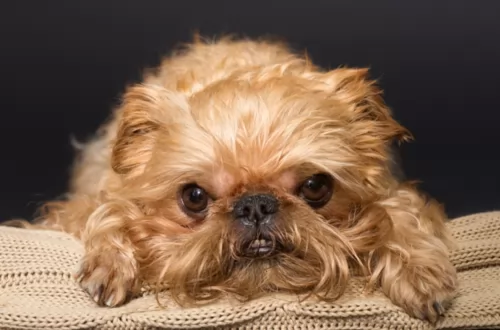 The Brug or Griffon Pug is not a purebred dog at this point in time. It is a cross between a Pug and a Brussels Griffon, currently known as a “designer dog” or a hybrid. This hybrid is really rare at this time but growing in popularity and breeders. Its exact history or original development is unknown at this time and needs to be researched as the hybrid develops into a breed, or breed clubs are formed. If you like either of the two breeds involved, you are sure to like the Brug. They are obviously not recognized by the major kennel clubs, but they are registered with a variety of hybrid/designer dog clubs. These include:
The Brug or Griffon Pug is not a purebred dog at this point in time. It is a cross between a Pug and a Brussels Griffon, currently known as a “designer dog” or a hybrid. This hybrid is really rare at this time but growing in popularity and breeders. Its exact history or original development is unknown at this time and needs to be researched as the hybrid develops into a breed, or breed clubs are formed. If you like either of the two breeds involved, you are sure to like the Brug. They are obviously not recognized by the major kennel clubs, but they are registered with a variety of hybrid/designer dog clubs. These include:
 The Tibetan Mastiff is still considered to be a primitive breed originating in Tibet centuries ago. The breed was developed to guard property and livestock. They still do this as well as being a much loved family dog and a show dog as well. There is very little history that is documented for the breed prior to the 19th century.
The Tibetan Mastiff is still considered to be a primitive breed originating in Tibet centuries ago. The breed was developed to guard property and livestock. They still do this as well as being a much loved family dog and a show dog as well. There is very little history that is documented for the breed prior to the 19th century.
Believed to be centuries old with ancestors who are mastiff like dogs that developed into two different types of Tibetan Mastiffs. These types are the Tsang-Khyi and the Do-Khyi. The Tsang Khyi were guardians for Tibetan monks, while the Tsang-Khyi guarded flocks for nomadic shepherds and in villages.
The first Tibetan Mastiff was imported in 1847 to England and presented as a gift to Wueen Victoria, from India’s Viceroy. By 1873 there was an English Kennel Club and the breed was labeled a large dog from Tibet and entered into the EKC Stud Book.
The next year the future King Edward VII, brought another two Tibetan Mastiffs to the United Kingdom to show in 1875. The first breed club began in 1931. The world wars interfered and no new dogs were imported to England until 1976. Two dogs were given to the President of the United States in the late 1950’sbut were not bred and it wasn’t until 1970 that any more were imported. The US Tibetan Mastiff Club was not founded until 1974 and they were first entered in a National Specialty show in 1979.
In 2007 the AKC recognized the breed as a working dog since 2007. It’s hard to find a purebred Tibetan Mastiff in Tibet anymore.
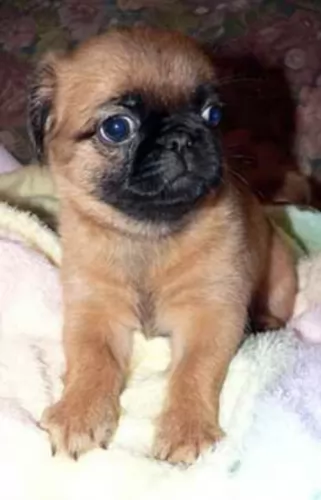 Like its two parental breeds, the Brug is a smaller sized dog – both parents are lab dogs and so is the Brug. Because they are hybrids, Brugs can be very different in appearance but most seem to have large eyes, squishy faces, black masks, fluffy hair, long black whiskers, short fluffy hair, flat ears and a fluffy tail. They could be in any of a number of colors including fawn, black, cream or apricot.
Like its two parental breeds, the Brug is a smaller sized dog – both parents are lab dogs and so is the Brug. Because they are hybrids, Brugs can be very different in appearance but most seem to have large eyes, squishy faces, black masks, fluffy hair, long black whiskers, short fluffy hair, flat ears and a fluffy tail. They could be in any of a number of colors including fawn, black, cream or apricot.
 Both types of Mastiffs can be present in the same litter, so that both larger and smaller pups are present. Both types are well-muscled and structured. Today’s dogs being developed in China and the West are much larger than the previous ones. These dogs would be less useful to the nomads and cost too much to feed. Today’s dog is very large with a large head and a long double coat. This coat can be black, brown, gold, and blue, with or without tan markings. There are now a few white Tibetan Mastiffs being bread.
Both types of Mastiffs can be present in the same litter, so that both larger and smaller pups are present. Both types are well-muscled and structured. Today’s dogs being developed in China and the West are much larger than the previous ones. These dogs would be less useful to the nomads and cost too much to feed. Today’s dog is very large with a large head and a long double coat. This coat can be black, brown, gold, and blue, with or without tan markings. There are now a few white Tibetan Mastiffs being bread.
The breed standard for the Mastiff is different in the West than in the East. In the East the breed is broken into two categories – the Lion Head and the Tiger head.
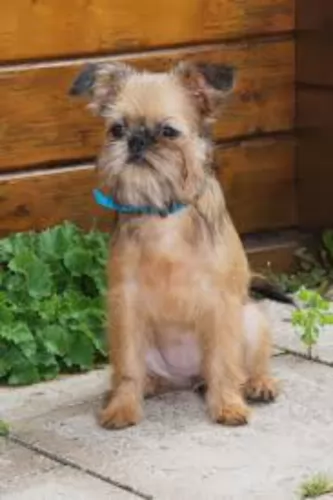 This hybrid is a loyal little dog. They are an affectionate lap dog that wants to be with his humans all the time. They have a very pleasant disposition and do well with children and other dogs. They might be shy to begin with but will warm up to affection. However, they are willful and self-important at times. This is tempered by their great sense of humor and empathy to its peoples’ moods. Left alone too long, they will tend to bark excessively.
This hybrid is a loyal little dog. They are an affectionate lap dog that wants to be with his humans all the time. They have a very pleasant disposition and do well with children and other dogs. They might be shy to begin with but will warm up to affection. However, they are willful and self-important at times. This is tempered by their great sense of humor and empathy to its peoples’ moods. Left alone too long, they will tend to bark excessively.
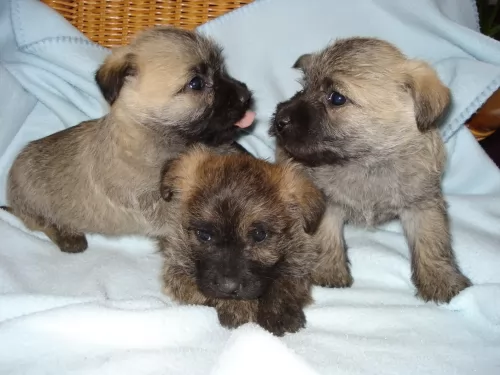 Usually the hybrid dog can have better health than either of the parents. This is true with the Brug as well, but there are also some issues they may inherit from the parents or face simply because of their size and complexion. These include:
Usually the hybrid dog can have better health than either of the parents. This is true with the Brug as well, but there are also some issues they may inherit from the parents or face simply because of their size and complexion. These include:
 Though considered a primitive dog and isolated for several centuries, so they should not have as many genetic or inherited conditions as other dogs with more cross and in-breeding. These are the potential health issues they might develop:
Though considered a primitive dog and isolated for several centuries, so they should not have as many genetic or inherited conditions as other dogs with more cross and in-breeding. These are the potential health issues they might develop:
Elbow and Hip dysplasia – can lead to lameness and arthritis.
OCD Osteochondrois Dissecans – this is also an orthopedic condition when the soft tissue growth is abnormal in the joints. It is painful and the joint is stiff. Don’t breed a dog that has this condition.
Panosteitis – Canine growing pains. Inflammation of the long bones in large dogs as they grow. They will eventually out grow it. Pain can be managed through medication.
Autoimmune Hypothyroidism – Hormone deficiency leading to flaky skin, weight gain and lack of energy. Can be managed through medication.
Canine Inherited Demyelinative Neuropathy – If your Tibetan Mastiff is going to have this condition, they will have it by six weeks of age. Weakness in the hind legs leading to paralysis.
Bloat – deadly if not treated immediately and related to dietary habits.
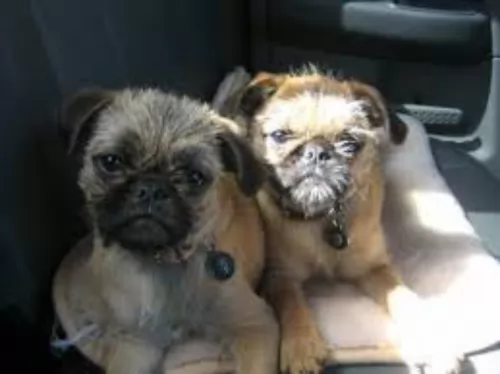 Don’t let this dog get overweight. Feed a high quality dry food intended for small or toy dogs. One fourth to one half of a cup per day in two separate meals is what is recommended.
Don’t let this dog get overweight. Feed a high quality dry food intended for small or toy dogs. One fourth to one half of a cup per day in two separate meals is what is recommended.
Patella Luxation or slipped knee caps – small dogs often have this issue. The patella is the knee cap and layman often called it a slipped knee cap, but it is also called slipped stifles. The femur, the tibia and the patella do not line up and this causes an abnormal gait or even lameness. Puppies are born with this, but it does not exhibit symptoms until years later. Arthritis is the most common result. Occasionally surgery is required.
Eye Issues – Cherry eye, a genetic disease, as well as irritation from air borne particles, allergies or scratches.
Skin Allergies – They can have skin allergies so watch for excessive licking or scratching.
Breathing Issues – Asthma and respiratory issues are common among small dogs with these types of faces.
Like their 2 breed parents, the Brug is a small but energetic hybrid. They need to play and run on a daily basis. Leash walks are good, but they need a yard or dog park as well. They are athletic little dogs and are good at tracking, obedience and agility. You cannot force them to do an activity but if its fun they will jump right in.
 Don’t feed the puppy too much protein as you want to prevent Panosteitis and growing too quickly. Do not overfeed. Feed 4-5 cups of high quality large breed puppy food in 3-4 meals day.
Don’t feed the puppy too much protein as you want to prevent Panosteitis and growing too quickly. Do not overfeed. Feed 4-5 cups of high quality large breed puppy food in 3-4 meals day.
4 to 6 or more cups of a high-quality dog food daily, divided into two meals. To avoid bloat do not feed before or after vigorous exercise.
Calm and laid back when inside.
They need 20-30 minutes of vigorous exercise and play daily. They prefer to play with other large dogs.